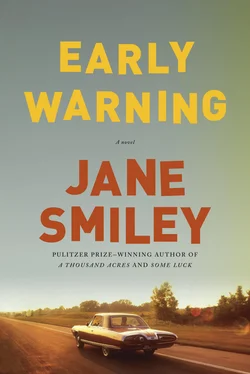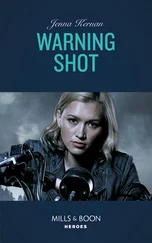Jane Smiley - Early Warning
Здесь есть возможность читать онлайн «Jane Smiley - Early Warning» весь текст электронной книги совершенно бесплатно (целиком полную версию без сокращений). В некоторых случаях можно слушать аудио, скачать через торрент в формате fb2 и присутствует краткое содержание. Год выпуска: 2015, Издательство: Knopf, Жанр: Современная проза, на английском языке. Описание произведения, (предисловие) а так же отзывы посетителей доступны на портале библиотеки ЛибКат.
- Название:Early Warning
- Автор:
- Издательство:Knopf
- Жанр:
- Год:2015
- ISBN:нет данных
- Рейтинг книги:5 / 5. Голосов: 1
-
Избранное:Добавить в избранное
- Отзывы:
-
Ваша оценка:
- 100
- 1
- 2
- 3
- 4
- 5
Early Warning: краткое содержание, описание и аннотация
Предлагаем к чтению аннотацию, описание, краткое содержание или предисловие (зависит от того, что написал сам автор книги «Early Warning»). Если вы не нашли необходимую информацию о книге — напишите в комментариях, мы постараемся отыскать её.
, a national best seller published to rave reviews from coast to coast.
Early Warning — читать онлайн бесплатно полную книгу (весь текст) целиком
Ниже представлен текст книги, разбитый по страницам. Система сохранения места последней прочитанной страницы, позволяет с удобством читать онлайн бесплатно книгу «Early Warning», без необходимости каждый раз заново искать на чём Вы остановились. Поставьте закладку, и сможете в любой момент перейти на страницу, на которой закончили чтение.
Интервал:
Закладка:
He handed in his paperwork, and twenty-four hours later, still foggy from the long trip, he was sent to the 101st, at Phu Bai, a flat, humid spot near the ocean, though no breeze seemed to blow — it was more like Maryland than California.
Their hootch was sixteen feet wide and thirty-two long, with a plywood floor. The walls were one sheet of plywood high, and above that, screen. The corrugated tin roof was weighted down with sandbags, and sandbags were also piled around the walls. Every time a rocket hit outside the hootch, shrapnel flew into the sandbags or over where Tim was lying in his cot, which was eighteen inches off the floor. The other principal feature of his hootch was clouds of mosquitoes.
Two weeks after Tim arrived, a rocket managed to make its way through the open door of another hootch. The roof was blown off, and five soldiers were killed. About ten days after that, a rocket hit a fully loaded helicopter on the airfield in just the right spot to blow up all the armaments it was carrying, in a spectacular explosion that jolted the helicopter into a nearby JP-4 that was holding five thousand gallons of rocket fuel. When that went up, the ground shook. Ten soldiers were medevaced out that evening, but then it was quiet. As the units pushed, day by day, farther into the hills, unbearably hot and much more humid even than Virginia, rocket attacks got less frequent.
He got used to his job, which had two parts. One was to drive his captain in the jeep out of the base to check on the signalmen. Some of these men were no more than ten minutes away but, depending on circumstances, could seem to be on the other side of the world. His other job was to get in a helicopter and fly out to the firebases. Tim was to make sure his guys had supplies, but the mortician’s job was to take the body bags and pick up the bodies. At first, Tim could not help watching. There weren’t too many casualties — a body every few days at the most. The creepiest part was not death, even gruesome rocket-attack death — it was the way the mortician took the dead soldier’s dog tags from around his neck, slipped them between the corpse’s two front teeth, then whacked them with the butt of his weapon to jam them into the gums.
When he drove Captain Bloom, they made their way sometimes in relative solitude and sometimes through droves of people — women, children, old men, all with the sun beating down on their heads. These people would be transporting whatever they could carry or push in what looked more or less like wheelbarrows. Captain Bloom babbled as they drove: Watch this, watch that, careful, do you see the child running there, stop for a minute. You could say boo to Captain Bloom and he would jump out of the seat of the jeep. Captain Bloom was a square-shaped West Pointer originally from Washington State, at the base since January. The object of their drives was to get to the spot where they could make as much contact as possible with each of their guys at the firebases in the jungle. At this spot, Tim would turn on the radio behind him in the jeep and call up each base to get a report. If they could not reach the base, they had to drive even closer to the edge of the impenetrable green vegetation, and figure out what had happened.
The scariest thing that happened to Tim himself was also his best story — he told it for days afterward. He was out at a firebase to the north, on a flat hill just above a rice paddy. The helicopter lowered itself and picked up the body bag and the mortician; then Tim jumped in. The copter started to lift off, and right then there was shooting from the perimeter. The helicopter jerked upward, and he fell right out. He must have been sixty feet in the air. Without even thinking, he rolled himself as if for a cannonball off the diving board. He dropped into the rice paddy, plopped right down into it like a tulip bulb. He was tall enough to get his nose out to breathe and his arm out to wave. He shook his head back and forth to toss the water out of his eyes, and saw the helicopter lower toward him. When the ladder dropped, he somehow grabbed it, and it yanked him right up and out, covered with mud and soaking wet. When he told the story, he said that there had been a loud sucking sound as he was pulled from the paddy.
They had been mostly inside their hootches for about two days, waiting out what was expected to be a typhoon. The rain stopped in the night — Tim woke to the silence. The air was still hot and wet. In the morning, right after breakfast, Captain Bloom was on him first thing — these storms meant havoc at the bases. They needed to communicate with them right away, find out what was going on. By the time they had the jeep ready and the radio stashed behind Tim’s seat, the sky was clear and the air merely damp. Tim drove slowly, creeping along the road out of the base. The parade of families had diminished but not halted; everyone was dripping wet.
The road hooked left, and Tim had to slow down. He turned the wheel. Captain Bloom had his weapon across his lap, and he was leaning forward, looking down the road. As Tim pressed the brake pedal, he just happened to glance to the right, and he saw a boy with thin arms and thick black hair staring at him, and then a grenade flew into the back of the jeep. It landed just behind the radio and rattled around. Tim yelled something, and the last thing he saw was Captain Bloom’s face turning toward him, and then fragmenting into the wet air.
—
LILLIAN RECEIVED Tim’s last letter the day after the telegram. It was wedged benignly between the electric bill and a letter from her mother. His handwriting, always nearly illegible, now looked terrifyingly meaningful. It took Lillian several seconds to make herself touch the letter, and then she could not help putting it to her nose and sniffing it. It smelled, like all of his letters from Vietnam, faintly of sandalwood. She stared at it for a long time before walking back to the house and placing it on the dining-room table, next to yesterday’s New York Times , which Arthur had been reading when the telegram arrived. He had left it open to an article about Nixon addressing the American Legion at the Hilton. Arthur had been supposed to attend, but had not done so. Now Lillian looked away from the letter and stared at the article. Nixon had declared, “Those who predict the Vietnam War will end in a year or two are smoking opium or taking LSD.” Lillian looked at the letter again.
Arthur had pulled a string, and would be driving out to Andrews AFB to watch them bring the casket. He was taking Dean. Debbie, who had already left for Mount Holyoke, would be home for the funeral. Tina had been in her room for twenty-four hours, working on a memorial painting. As Lillian stared at the letter, she had to put both her hands on the table to prevent herself from passing out and falling out of her chair. The letter was addressed to her — that’s what he had done since heading off to boot camp, address letters to her, not Arthur, knowing that she would read them aloud. She and Arthur had discussed this quirk, and they agreed that addressing the letters to her let Tim more easily reassure everyone that he was fine, that he had simply embarked upon a classic masculine adventure. Letters to his father might have consisted of only the fewest words—“Okay here. The colonel is an asshole. Shot two Cong yesterday.”
It was dated a week previously.
Dear Mom,
It’s been raining again, pretty hard. It’s such a swamp here, I don’t know how they stand it. Thanks for the books. I started the one Cat’s Cradle. It is pretty good. I loaned the one Dune to another guy in my hootch who was reading Atlas Shrugged so many times that his book fell apart, but when he started reading Dune , he finally shut up about it. I bought this Vietnamese guitar. It is pretty bad, and because of the rain, even worse, but I can get some sound out of it. I play it with one of the other guys who is from North Carolina and really good. His guitar is better than mine. Another guy, who is from Austin, Texas, plays the drum, which is really a mermite can, but he gets great sounds out of it. If I had a band again, I would definitely include a mermite can or two. Also thanks for the cookies. I think I had one. As soon as the guys saw them, they passed them around and they were gone. Captain Bloom says, “More more more.” I suppose you could say that that’s an order, Mom. Otherwise, things are pretty quiet, I guess the infantry is doing their job, which is called Operation Byrd, though I call it Operation The Byrds just for a joke. I guess we talk a lot about music here, because Billy Copps was in a band, too, before he came here. Austin, Texas, sounds like a pretty neat town.
Читать дальшеИнтервал:
Закладка:
Похожие книги на «Early Warning»
Представляем Вашему вниманию похожие книги на «Early Warning» списком для выбора. Мы отобрали схожую по названию и смыслу литературу в надежде предоставить читателям больше вариантов отыскать новые, интересные, ещё непрочитанные произведения.
Обсуждение, отзывы о книге «Early Warning» и просто собственные мнения читателей. Оставьте ваши комментарии, напишите, что Вы думаете о произведении, его смысле или главных героях. Укажите что конкретно понравилось, а что нет, и почему Вы так считаете.











